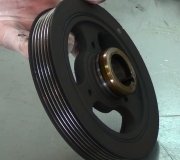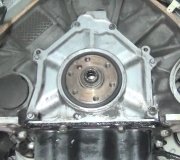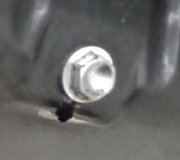I would consider not panicking just yet. Those metal chunks didn't all show up within the last hour or two. They have probably been there for quite a while. When we see metal particles we think of the engine's bearings coming apart. Those are actually curved pieces of flat metal, usually with three layers. The outer layer that you can see and touch is very soft so a dirt particle can embed in it rather than go around and around and scratch the "journal" that rides on that bearing. (The ball bearings, if you want to imagine it that way, are the molecules of engine oil).
When something happens, like a loss of oil pressure due to low oil level, the spinning journals start to rub and grind on the bearings. That first layer of metal chips off, then the very small gap of around.006" increases a lot. That bigger gap lets the pressurized oil run through and fling off much easier, and that results in lower oil pressure. You'd see that on a dash gauge. A common oil pressure might be around 40 psi. If you only have a low oil pressure warning light on the dash, many of those don't turn on until the pressure drops to ten pounds or even less. By that time the disintegrating bearing is causing low pressure which causes less lubrication, which causes more wear on all the other bearings, which causes, ... Uhm, ... Lower oil pressure, until the second and third layers of metal shear off. By that time the hardened steel journals have been "scored", meaning grooves are torn into the hardened surfaces, and those grooves further shred the soft bearings.
Once this damage starts to take place, it doesn't take weeks or months to lead to a total failure. It takes minutes. If the engine has been running fine, keep up with scheduled oil changes and use a good-quality oil. Oil will always be oil. We change it to get the carbon out and to replenish the additives in it that wear out in about 3,000 miles. Those are detergents, seal conditioners, anti-foaming agents, and friction modifiers.
Remember too that another one of oil's jobs is to pick up stuff, like metal chips, and transport them to the filter where they will be trapped and hidden. Since yours are sitting harmlessly on the bottom of the pan, they're likely stuck in some minor sludge, and that's why I think they've been there for quite a while. If problems do develop, you'll hear a loud banging coming from the engine in time with its speed. If you have a dash gauge, you'll see it bouncing up and down in time with the noise. Even at that point you don't need another engine. The repair would involve replacing the crankshaft, (which is a pretty big job), the crankshaft bearings, the connecting rod bearings, and cleaning the pan and oil passages thoroughly. The reason most mechanics don't want to do this is they know they're being penny-wise and dollar-foolish. If they don't get every metal chip out, those can start to circulate and take out all the new parts, often in less than a few hours. We like to save you money, but we know more customers get angry with us after we try to take the inexpensive way out and it comes back to bite us. Our reputation takes a beating then too. Customers remember a failed repair a real lot longer than an expensive repair bill.
Keep in mind too those metal chips could easily be from something other than the bearings. You might find the same thing in a used engine too, so what will you have gained?
Saturday, June 6th, 2015 AT 8:56 PM


